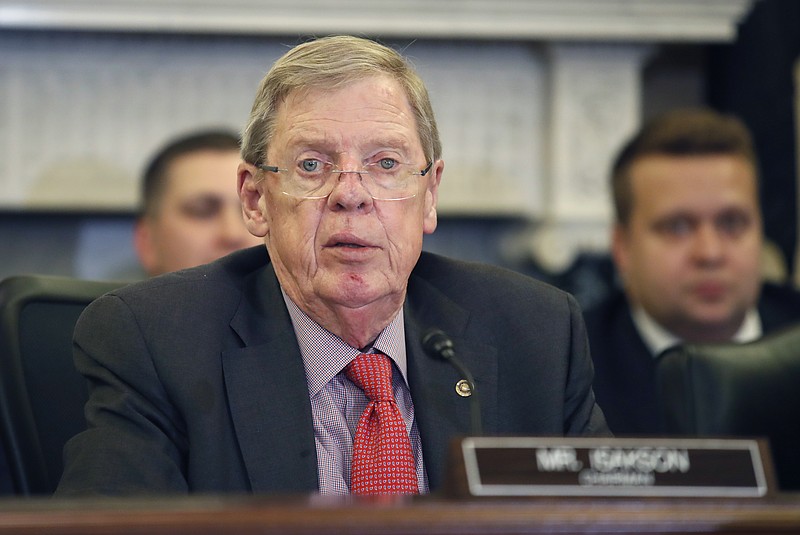There is something to be said for having an impending deadline in politics, and for U.S. Sen. Johnny Isakson, R-Georgia, that means devoting his final three months in office toward advancing legislation he hopes will help reset Washington's stalemate over gun violence.
The headline on the The Atlanta Journal-Constitution story was clear: "Sen. Isakson's swan song: Resetting the gun debate."
He's not pitching a gun-control bill, he insists. Rather, on Thursday he will introduce a bill that would set aside $75 million a year for the Atlanta-based U.S. Centers for Disease Control and Prevention to study the factors that contribute to mass violence. And not just acts carried out with guns, but also knives, explosives and motor vehicles.
Going a step further than making mere counts, the bill also would allow the CDC to formulate prevention strategies based on data patterns.
"I don't know anybody that doesn't feel sympathy for the parent of a child who was killed in an accident at a school or mass murder of any type," Isakson said in a recent interview. "All of us want to stop that. And the way you stop a disease is you diagnose them and find out what causes them."
The Journal-Constitution notes that the bill is likely Isakson's last shot "at brokering a bipartisan deal before he resigns Dec. 31 due to health reasons, ending a political career that's stretched for 45 years." Isakson has been diagnosed with Parkinson's disease, had two back surgeries, recently had a spot removed from a kidney and is recovering from a fall that fractured four ribs and tore his rotator cuff.
It's notable that the three-term senator is introducing his new legislation alone. He has no endorsements from the Republican leadership that so fears President Donald Trump, who consistently sides with the National Rifle Association. Nor did Isakson bring support from Democrats, who just days ago launched an impeachment inquiry that may grind all legislating on Capitol Hill to a halt.
But that's not stopping him.
"I'm just trying to get the debate on a higher plane and intellectually on a plane where it's not political," he told Atlanta reporters.
Isakson has always touted his A-rating from the NRA, but he hasn't let it paralyze him. In April 2013, he was one of 21 "NRA A-rated" senators who voted to defeat the filibuster of a background checks bill after the Dec. 14, 2012, Sandy Hook Elementary School shooing in Newtown, Connecticut. (Fellow Georgia Sen. Saxby Chambliss and Tennessee Sens. Lamar Alexander and Bob Corker also voted to break the filibuster. Ultimately, however, the background checks bill was defeated.)
Again, in 2017, Isakson broke with the NRA. While he stated he did support concealed carry nationwide, he did not support campus carry, telling the University of Georgia's Red & Black that it was "not the appropriate thing to do."
In February 2018, in response to the Stoneman Douglas High School shooting in Parkland, Florida, Isakson stated that "We have to do everything we can within our powers to make sure it never happens again."
This newest no-brainer effort by Isakson also may be tough.
The NRA has been successful since the mid-90s at barring the CDC from advocating or promoting gun control - primarily by limiting money to that end in a rider known as the Dickey Amendment.
Thanks to that amendment, the U.S. for decades did not throw its full resources against gun or mass violence the way we did with tobacco or car crashes.
But Parkland, and the wave of activism that followed it, prompted Congress last year to clarify that CDC could, in fact, use government funds already in its budget to "study" gun violence. But the move didn't earmark additional money for it. After Democrats won the House, they began fighting for $50 million. Sen. Majority Leader Mitch McConnell, however, has sat on that and any other bills that even mention firearms.
This year, in the aftermath of August mass shootings in El Paso, Dayton, and Chicago that left dozens of people killed and more wounded - all within 13 hours - experts have clamored for Congress to pass what they say should be the low-hanging fruit: Funding gun violence research.
Isakson says his bill wouldn't repeal the Dickey Amendment, but it does include $75 million a year to study mass violence and also formulate prevention strategies.
In the meantime, President Trump met last week with NRA chief Wayne LaPierre. Since then the president has cooled off on his previous hints that he would support stricter background checks on assault gun purchases.
And this weekend, seeking to deflect from the impeachment inquiry news, Trump tweeted a video titled: "They are trying to stop ME, because I am fighting for YOU!" It goes on to say, in part: "The Democrats want to take away your guns ... "
How did we get from funding studies of mass violence to taking away your guns?
Did studying car accidents take away cars?
Did studying tobacco ban cigarettes?
Thank you, Sen. Johnny Isakson, for trying to bring a bit of sanity back to our government and our lives. May your "swan song" be our better tomorrow.
